- Home
- Graham Hancock
War God: Nights of the Witch Page 15
War God: Nights of the Witch Read online
Page 15
‘That’s Don Pedro de Alvarado,’ Melchior said. ‘He does like to make a dramatic entrance.’
Chapter Twenty-Seven
Santiago, Cuba, Thursday 18 February 1519
Smash! Thud! Crash! Bang! Cortés awoke in hot darkness, sweat lathering his body, his mind sluggish, a stunning headache addling his brains. Trapped! He was trapped in some thundering Hell! Smash! Crash! Thud! His arms and legs were tangled, every movement seemed to constrict and bind him further and for a few terrifying, vertiginous seconds he had no idea where or even who he was. Then he heard Bang! Bang! Bang! Crash! Thud! – hammer blows following one another in quick succession – and suddenly it all came back to him. He was tangled in his hammock in his stateroom on the Santa María. He had overslept his siesta. Night had fallen. And a few paces away, on the other side of the partition, Muñoz was still beating his page. Thud! Smash! Bang! Bang!
Enough! thought Cortés. With a mighty effort he wrestled himself free of the hammock and dropped barefoot to the floor. He was about to pound on the partition and yell some insult when he remembered his dream. He hesitated, heard further loud banging and a gruff voice shouting ‘Cortés, wake up!’, and realised with relief the noise wasn’t coming from Muñoz’s quarters at all. Cursing as he stubbed his toe in the darkness on the corner of his sea chest, he strode to the door, slid back its heavy bolts and flung it open.
‘Ah,’ said Alvarado, ‘at last! It’s like trying to wake the dead.’ He was holding a lantern and brushed past Cortés into the much-reduced stateroom. ‘Dear God!’ he said, waving the lantern at the partition. ‘What happened here?’
Cortés held up a warning finger. ‘Next door is my guest, Father Gaspar Muñoz. He’ll sail with us as the expedition Inquisitor.’
Alvarado made the face of a man sucking a lemon and mouthed, ‘Velázquez?’
Cortés nodded yes.
Alvarado grinned. ‘There’s trouble at the Customs House,’ he boomed. ‘They’ve impounded our whole consignment of falconets. You need to come now.’
Cortés knew that all the expedition’s small cannon, including the falconets, had already been safely loaded, but made appropriately disbelieving and infuriated noises as he dressed in haste, tugged on his boots and sword and marched out onto the navigation deck with Alvarado, calling for his horse to be saddled and brought down to the pier. The two men talked of nothing but falconets and Customs duties until they rode off, but when they reached Alvarado’s ship they reined in, dismounted and went quietly on board. The moon was up now, and the sky bright, making them visible from the Santa María, but no one seemed to be watching.
The San Sebastián was built to the same design as the Santa María, with the stateroom abaft the navigation deck occupying the whole of the stern beneath the aftcastle. On the San Sebastián, however, there had been no need to partition the captain’s quarters to make space for a black-robed friar and Alvarado had the full, generous, well-lit area to himself. ‘We can talk safely here,’ he said. He reached into his jerkin and pulled out a single sheet of vellum. ‘First you need to read this.’
Cortés took the sheet but deliberately ignored it as he moved to one of the two stuffed chairs with which Alvarado had furnished the stateroom. He sat down, noticing for the first time that there was something odd about the manner of his oldest and closest friend. He was holding his left arm in an awkward, delicate way, his hair was wildly dishevelled, and there were streaks of what looked like dried blood – apparently not his own – on his jerkin and hose. He wore one of the new Toledo rapiers in a scabbard on his hip, but also carried a huge single-edged falchion, thrust into the front of his sword belt.
‘Isn’t that Zemudio’s blade?’ Cortés asked. He’d been in and out of the governor’s office more times than he’d care to count in the past month and the bodyguard was always there.
Alvarado grinned like a puppy waiting to be praised. ‘I just killed Zemudio,’ he said.
Cortés frowned. Knowing his friend as he did, he had no difficulty in believing him. Still he had to ask: ‘Why would you do such an insane thing?’
‘To get that sheet of vellum you’re holding in your hand.’ Alvarado was bouncing up and down with impatience: ‘Read it now! It proves everything.’
‘Proves what?’
‘Just read it!’
From the Hand of His Excellency Don Diego de Velázquez, Governor of Cuba
To Don Pánfilo de Narváez
This 18th day of February, Year of our Lord 1519
Don Pánfilo,
The matter of our previous discussions has now reached its crisis and all is to proceed as we have planned. Tonight I will relieve Don Hernando Cortés of command of our expedition to the New Lands and appoint you as captain-general in his place. Cortés will be arrested discreetly, late at night, so as not to excite resistance from his supporters. So, prepare yourself my friend! When we have him in chains I will send for you.
May God bless this night’s operations, and our expedition, which I am certain will be lucrative and crowned with success for us both.
Yours in Christ,
Diego de Velázquez
After Cortés had read the letter, turning over in his mind all the layers of bad faith and betrayal between him and Velázquez, Alvarado flopped down in the armchair opposite him. ‘The discreet arrest he talks about,’ he said with a knowing wink, ‘that involves me.’
Cortés sighed: ‘What’s he paying you?’
‘Twenty thousand gold pesos. I was actually able to get five thousand up front … Mine to keep, I reckon. Spoils of battle and all that … Anyway, I’m to invite you to dinner at ten o’clock tonight here on the San Sebastián and pour this in your wine,’ Alvarado fished in his pocket and produced a little glass vial containing a colourless liquid. ‘An hour later you start puking your guts out and running a deathly fever. I’m to send for Dr La Peña – another one of Velázquez’s stooges. He’ll ship you off to his hospital in a horse-drawn carriage, but you won’t ever get there. Velázquez’s guards will detain you on the road, you’ll be flung in jail in his palace and, when the drug wears off, you’ll be questioned under … I think the term is “extreme duress”?’
‘I take it,’ said Cortés, ‘since you’re telling me all about it, that none of this is going to happen.’
Alvarado grinned again: ‘Of course it’s not going to happen! You’re a winner! I want to sail with you, not that ass Narváez. Besides, you’re my friend.’
‘You’re giving up a lot of money for friendship.’
‘Fifteen thousand gold pesos to be exact. But I’m a businessman. I expect to make that back many times over with my friend Hernán Cortés in command of the expedition.’
‘And you fought Zemudio … To the death.’
‘Well … We needed to see Narváez’s orders, didn’t we? Had to know what was in them.’
‘Thank you, Don Pedro,’ said Cortés. He felt touched and deeply grateful for his friend’s loyalty, and wanted to reward him. ‘I’ll not forget this.’
Another big grin from Alvarado: ‘I’ll not let you forget it.’
‘You realise we’ll have to sail?’ said Cortés. ‘Tonight.’
‘Are we ready?’
Ready? Cortés thought. Ready enough. He’d been preparing for such a sudden, unscheduled escape since the moment he’d first talked Velázquez, with honeyed words and grand promises, into giving him command of the expedition three months earlier. It was to be his ultimate revenge on the old monster for forcing him to wed Catalina. And revenge, as everyone knew, was a dish best served cold. The months he’d spent rotting in jail on trumped-up charges until he’d finally given in to Velázquez and married his hell-bitch niece rankled constantly in his memory. But if this colossal gamble paid off, if he could steal the expedition and get away with it, and most of all if the rumours of the fabulous wealth of the New Lands turned out to be true, then he would be rich beyond all imagining and the name of Cortés would be honoured by his
tory, while Velázquez would be cut to the quick in his pride and his pocket and remembered by no one within a generation. The only danger – the one that had now come to pass – was that the governor would guess the plan before they were ready to sail. This was why Cortés had done everything fast and lied about progress, making it seem that much more time would be needed before the ships were fully loaded when, in truth, apart from a few items, they were stocked and ready to sail tonight. All crews, horses, dog teams, and almost all the enlisted men were boarded and ready to go at a moment’s notice, and those who were not were in the taverns of Santiago where they could be easily found.
‘Are we ready?’ Alvarado repeated.
‘Sorry,’ said Cortés. ‘A lot on my mind. Yes … we’re ready. Almost. But there’s one pressing need we can’t neglect. With soldiers and ships’ crews added together, we’ve more than six hundred mouths to feed, and Córdoba’s experience proves we can’t count on friendly natives to supply us. We’re well stocked with staples but we must have meat for our men – fresh meat for the voyage, preserved meats and more livestock on the hoof to sustain us until we’re self-sufficient in the New Lands.’
Alvarado raised an eyebrow: ‘Tonight? Where?’
‘The slaughterhouse. They have enough to feed the city. Let’s send a squad over there on the double to bring us everything they’ve got.’ Cortés paused, lowered his voice: ‘The other captains must know nothing of this until it’s done. I raised five good private soldiers to ensign rank yesterday. They’re grateful to me and they’ll do what we ask without question. One of them sails with you – Bernal Díaz, do you know him?’
‘I know him,’ said Alvarado with a sneer. ‘He’s a peasant. Not officer material.’
‘He’s literate. He keeps a daily journal.’
Alvarado shrugged. ‘So?’
‘It speaks of a certain seriousness of mind, don’t you think, a certain dedication when one of his class reads and writes? You judge by surface appearances, Pedro. I’ve looked deeper and I see great potential, high intelligence, unusual abilities, all gathered together in this young man. Send for him, please.’
Moments later heavy footsteps sounded on the navigation deck. There came a loud knock at the door and Bernal Díaz del Castillo clumped into the stateroom. He was twenty-seven years old, tall, heavy-built, with solid labourer’s muscles like a ploughboy and a big, sallow-skinned face that was all bony planes and angles. How very unsure of himself he was, how out of place he obviously felt, how overwhelmed at his elevation to ensign, and how desperately he wanted to please.
Cortés beckoned him closer: ‘Welcome lad,’ he said. He rubbed his hands vigorously together. ‘I’ve got a job for you to do and it’s got to be done fast …’
After Díaz had repeated his orders and lumbered off to carry them out, Cortés turned to Alvarado: ‘How long have we got until Velázquez realises you’ve played him false? Four more hours? Five? Let’s think this through.’
An Amsterdam clock stood in the corner of the stateroom. ‘No use looking at that,’ said Alvarado. ‘It’s been stopped for a year. But it’s around eight of the evening now. Sun’s been down for a couple of hours.’
Cortés nodded. ‘Velázquez told you to organise the dinner for ten o’clock. He’ll be expecting, what? That you’ll poison my wine within the first hour?’
Alvarado nodded in agreement: ‘Seems reasonable.’
‘In which case I’ll be expected to be showing symptoms by midnight. Agreed?’
‘Agreed.’
‘So around midnight we raise the hue and cry on the San Sebastián, and send a messenger to fetch Dr La Peña. It will take at least an hour for the messenger to reach him and bring him to the harbour. That would mean it’s one o’clock, maybe half past, when La Peña comes on board – around the time of tonight’s high tide. Velázquez won’t be surprised if the doctor stays on the ship for an hour before bringing his patient out, so I’d guess that makes us safe from interference until, well … let’s say two o’clock. We must sail no later than that; the ebb tide will aid our departure.’
‘What about the other captains?’ Alvarado asked. ‘They’re going to want to know why we’re embarking so suddenly. Some of them definitely won’t be ready, or will say they aren’t, and some of them are loyal to Velázquez – Juan Velázquez de León is his cousin for God’s sake; he’ll not stand by and let us steal away with the fleet.’
‘Cristóbal de Olid is also Velázquez’s man,’ said Cortés, naming another of the captains of the expedition, ‘and Diego de Ordaz used to be his major-domo. Velázquez put him here to keep an eye on me and stop me doing precisely what we’re about to do tonight. It just means we’re going to have to tell a careful story when we call the captains together.’
‘Do you have something in mind?’
Cortés leaned forward in his chair and rubbed his aching back. ‘Someone,’ he said. ‘Specifically Pedrarias. This afternoon my shipping agent returned from Jamaica. He brought word Pedrarias has assembled a fleet there twice the size of our own and hurries to stake his claim to the New Lands before we do.’
‘Damn the man!’ shouted Alvarado theatrically. ‘We have to beat him to it!’ He lowered his voice: ‘It’s not true, is it?’ he asked.
Pedro de Arias Dávila, Pedrarias for short, had earned a fearsome reputation in the Granada campaigns and during the Italian wars. He had arrived in Hispaniola in 1513 and sailed on with a small force to establish the colony of Castilla del Oro in Darién in 1514. There he had spread such ruin, rapine and mayhem that the colony had had to be abandoned in 1517, but he was still in the region and known to be looking for new ways to get rich by force of arms.
‘Fortunately it’s not true,’ Cortés laughed, ‘but it could be true, and that’s what matters. Olid, Ordaz and Velázquez de León all have as much at stake in the expedition as we do and none of them will want Pedrarias to snatch the prize. If they believe me they’ll all see why we have to set sail at once or risk losing precedence. We can’t wait another week, or even another day, to finish equipping and loading the fleet. Everyone will understand the haste, the urgent departure by night, even emptying the city slaughterhouse – it’ll all make perfect sense to them by the time I’m finished …’
Alvarado’s mind seemed to be elsewhere. ‘Damn,’ he exclaimed. ‘I’ve just remembered something …’
‘What?’ Cortés felt the slightest stir of anxiety.
‘Velázquez’s palace guard! He’s going to have a squad stationed on the harbour road to grab you from La Peña’s carriage. Those boys are pretty stupid, but even they’ll get suspicious if they see our men herding swine and cattle to the docks at one in the morning …’
Cortés was relieved. ‘That’s the least of our worries,’ he said. ‘I’ll send my scouts out to watch the road. They’ll tell us where the guardsmen have stationed themselves and in what numbers. We’ll deal with them.’ He grinned. ‘But first we’ve got to sell all this to the captains.’
Chapter Twenty-Eight
Tenochtitlan, Thursday 18 February 1519
Though she had nothing left to give, Tozi tried to fade the three of them when the soldiers entered the fattening pen, but the power had deserted her. Something had broken in her head. She could no longer even send the fog.
So they ran, and kept on running, dodging through the thinning crowds, hiding sometimes in pools of deeper darkness where the soldiers’ torches did not penetrate, then running again, always running, Malinal carrying Coyotl on her hip, as the prisoners were gathered in and herded remorselessly towards the gate. Tozi had no sense of the passage of time but at a certain point, quite suddenly, like water poured from a pot, the last of her strength flowed out of her. ‘I can’t go on,’ she said, halting near the bars where their flight had started. The pain in her head was unbearable. ‘I’m done in.’
Malinal, still with Coyotl on her hip, reached out and wrapped her in a warm embrace. Coyotl also flung his arms round her nec
k. My friends, thought Tozi again.
‘Let’s just stay here,’ said Malinal. ‘It’s as good a place to be as any.’ She gestured at the lines of soldiers with their guttering torches, working their way through the prison, tightening the net, efficiently rooting out fugitives from every corner and shadow. ‘They’re not going to stop until they’ve taken all of us, so running makes no difference, hiding makes no difference. Whatever we do they’re going to catch us. Maybe it’s time we accepted that.’
‘I never accept I’m going to get caught,’ flared Tozi. She felt threatened by the very idea. ‘Not today! Not ever!’
‘Well, let’s hope you’re right.’ Malinal set Coyotl on his feet. ‘But, honestly, we’re out of options.’
Through her own sickness and exhaustion, Tozi saw that Malinal too was close to breaking point. The strain of the last hours had taken a terrible toll on them both – and on poor Coyotl. ‘You’re the one who’s right,’ Tozi said after a moment’s thought. ‘There’s no point in running any more. Whatever the gods have in store for us, we’ll discover it soon enough.’
She sank down on her haunches and sat cross-legged. Malinal and Coyotl sat on either side of her and the three of them gazed out through the bars at the extraordinary spectacle evolving in the great plaza, their ears numbed by the shrieks and cries that echoed there and the loud, discordant music of the ritual.
Tozi looked up at the bright moon, close to full, approaching the heart of heaven and shedding an eerie luminescence over the two faces of the pyramid – the north, and the west – that were visible from the fattening pen. With this, and with the dance of the lanterns that had now resumed in the plaza, and the blaze of the torches and braziers at the summit of the pyramid, the whole scene was lit almost as bright as day. Tozi saw that hundreds of wailing and lamenting women, kept in line by guards armed with short spears, occupied every step of the north and west stairways and queued in the plaza below. It would be the same, she was sure, on the east and south sides of the pyramid. Those Moctezuma had killed earlier had only been a taster for the much bigger sacrifice now under way.

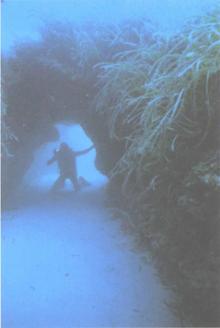 Underworld: The Mysterious Origins of Civilization
Underworld: The Mysterious Origins of Civilization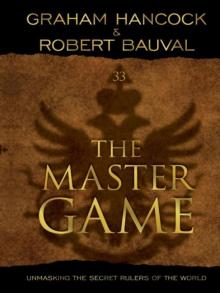 The Master Game: Unmasking the Secret Rulers of the World
The Master Game: Unmasking the Secret Rulers of the World America Before
America Before Entangled
Entangled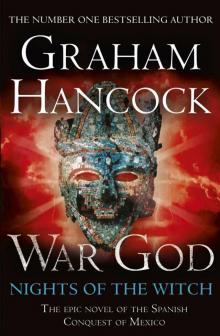 War God: Nights of the Witch
War God: Nights of the Witch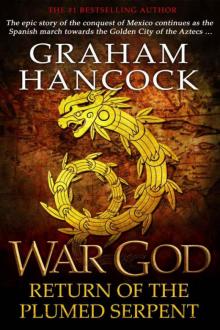 War God: Return of the Plumed Serpent
War God: Return of the Plumed Serpent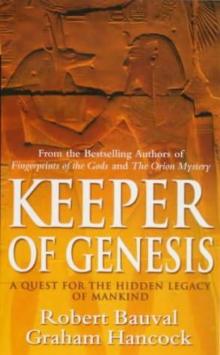 The Message of the Sphinx AKA Keeper of Genesis
The Message of the Sphinx AKA Keeper of Genesis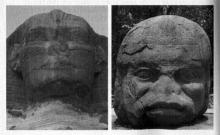 Fingerprints of the Gods
Fingerprints of the Gods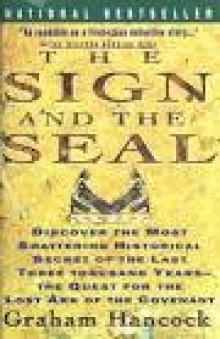 The Sign and the Seal
The Sign and the Seal The Mars Mystery: The Secret Connection Between Earth and the Red Planet
The Mars Mystery: The Secret Connection Between Earth and the Red Planet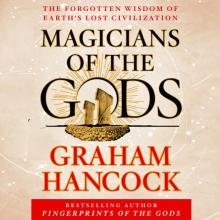 Magicians of the Gods: The Forgotten Wisdom of Earth's Lost Civilization
Magicians of the Gods: The Forgotten Wisdom of Earth's Lost Civilization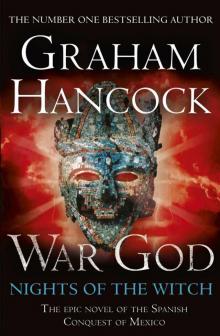 War God
War God Underworld
Underworld The Mars Mystery
The Mars Mystery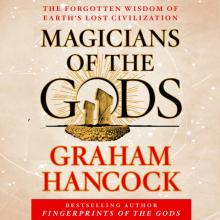 Magicians of the Gods
Magicians of the Gods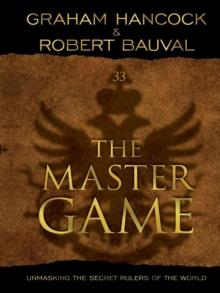 The Master Game
The Master Game